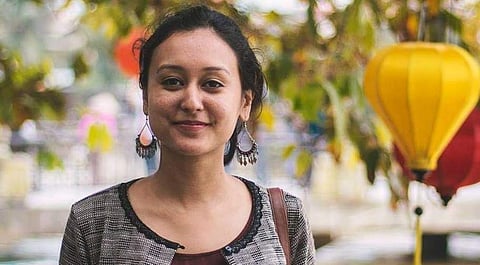

Every time Ankita Shah recited her poems during literary fests in college, she received a lot of applause. For her, poetry spelt happiness and served as a medium to express her emotions. The 27-year-old, who studied at the Narsee Monjee College of Commerce and Economics in Mumbai, did not give up her passion for poetry even after college. When she quit her corporate job chose to work at G5A Foundation for Contemporary Culture so that she could understand art and literature better.
Poetry, though, was the one thing that really stayed with her. Therefore in 2013, when she stepped out of college, she co-founded The Poetry Club. She recalls, "I started writing at a very young age and wrote mostly about the environment, nature and animals. I still remember that the first poem I wrote was about the endangered species of Olive Ridley Turtles and what can be done to save them. When in college, I found a friend, Trupthi Shetty, who also had the same passion. Both of us conducted a whole lot of literary activities. When we finished college, we realised that there was no proper platform to discuss our poems or literature other than an open mic night. That's when we decided to start The Poetry Club in Mumbai."
Ankita and her friend got in touch with lots of youngsters who were into poetry and told them about the club. They conducted sessions every Sundaywhere at least 80-100 people gathered. Over the years, more than 500 poets have taken centre stage. Her group is not only meant for English poets but is open to poets who write in all Indian languages — practically anyone. She explains, "While some people are comfortable with expressing their emotions in English poems, others are more comfortable expressing themselves in their mother tongues. That's how poetry and languages can be kept alive. It feels good to see many people from different states under one roof." In the next three months, Ankita wants to begin conducting workshops. She hopes to invite famous writers to the poetry club to speak about the importance of literature, forms of poetry and languages, the time when it took shape in India and much more.
Ankita usually writes poems on themes like heartbreak, family, love, time, memory, borders and walls, space and stars. "A lot of poems that I write are all about what I do and experience. These themes are very close to my heart. For instance, one of my poems, Borders, is all about the discrimination that I had to go through due to my looks. It is about the current situation in different countries where people are building walls between themselves creating enmity and shattering many dreams," says Ankita.
Apart from The Poetry Club, Ankita is a huge fan of the burgeoning open mic culture and what it has done for poetry. "Open mic is a platform where one gets the freedom to express his or her thoughts. There are no restrictions or silencing people from what they want to express. Another plus point of an open mic is it helps create new conversations, dialogue and awareness about different issues among people. The open mic culture is a way to create a revolution. There is no restriction on the style of writing poems. Poems recited on the open mic connect you with the person and the experiences that you might have gone through. It is not like those poems which we read during school days just for the sake of passing exams," says Ankita who discusses her poems either on the open mic or her Instagram account.
